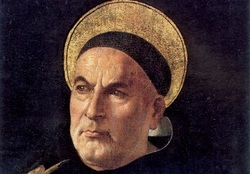
Thomas was born in Southern Italy, but of Germanic Hohenstaufen blood, and rather than become an abbot of the Benedictine monastery at which he began his education at age five, joined the newly-formed “Spanish” order of Friars Preachers. He began his studies at the University at the time, the University of Paris, the same year Albert the Great began teaching there. Although he taught in Paris for six years, at age 36 he left the Great University and spent the rest of his life wandering as a Friar Preacher, teaching at various Colleges, never more than two or three years in one place. In early 1274, the Pope called him from Naples to the General Council of Lyons in Southern France, but on the way north he became ill and died in the abbey of Fossanova.
A few months before he died, St. Thomas had already given up writing, having produced the most comprehensive integration of faith and reason the world has ever known. He had had a vision after Matins one morning, and later told Reginald, his secretary and traveling companion of many years, “compared to what I have seen, everything I have written seems like so much straw.” And this is why holy mother Church holds up St. Thomas for veneration and imitation: not because he was brilliant, perhaps the most brilliant of all western minds, but because he held his brilliance and all human brilliance in perspective. Certainly St. Thomas labored greatly in his studies and in his teaching, but one gets the sense not only of organic synthesis in his work, but also of humility and balance. My own introduction to St. Thomas came through my father, who told me that among all intellectuals, only Thomas had the humility to see the question first through the eyes of his opponents before presenting his own position. Here was a man who loved his interlocutors, and loving them, understood them.
Wisdom—the integration of faith and reason, of mind and heart—is a far greater good than knowledge, and it is a gift of the Holy Spirit. It can only be received by a humble heart and mind, by a person who prays and who pleads for it. So Scripture holds up King Solomon as wise, because he pleaded for wisdom: “Now God grant I speak suitably and value these endowments at their worth: For he is the guide of Wisdom….” St. Thomas excels precisely because he valued his endowments as endowments—gifts received from God—and did not overvalue them. He was smart, and he worked hard, but what is human knowledge compared to God? Only so much straw. Thomas knew he was a “master,” the most excellent teacher the Church has ever seen, and yet he called no man his “Master” but Christ.
Thomas never finished the Summa Theologica, as if to say that whatever we might say of God and his creation is never finished. Our education is lifelong, and will not be finished even on the day of our death. To put human knowledge in such perspective is true wisdom. This is the consolation of philosophy—that always a greater truth and beauty awaits us. Eye has not seen, nor ear heard, what God has prepared for those who love him.
Thomas was canonized because he loved God, and so loved his brethren, and loved all that God created. On behalf of the students, I wish to express our deep gratitude for our beloved tutors, who educate us for love above all. This is what particularly distinguishes Thomas Aquinas College—that, after the example of her Patron, she orients all knowledge toward its proper goal, that of loving God and neighbor. Let us love God as St. Thomas loved him, for love always seeks to know the beloved. Let us love Christ as his Mother loved him, entrusting our minds and hearts to him, our only Master, our only teacher, that we may know, love and serve him in this life, and be eternally happy with him in the next.


 RSS Feed
RSS Feed